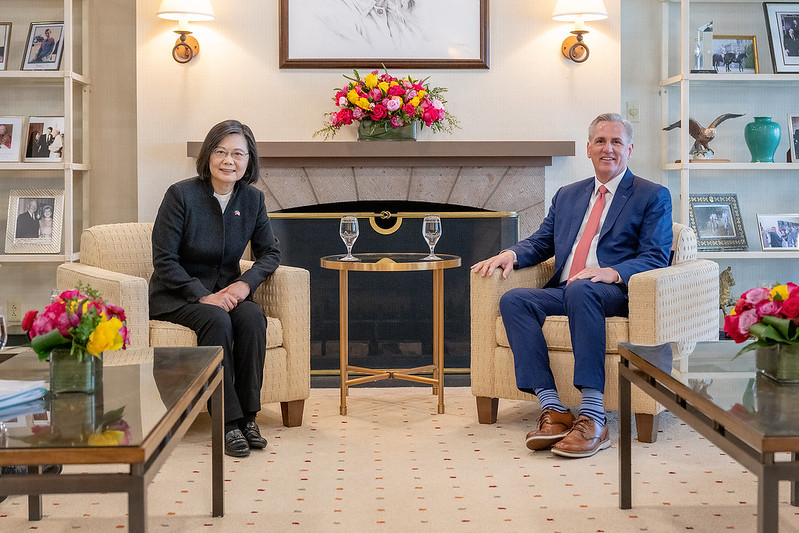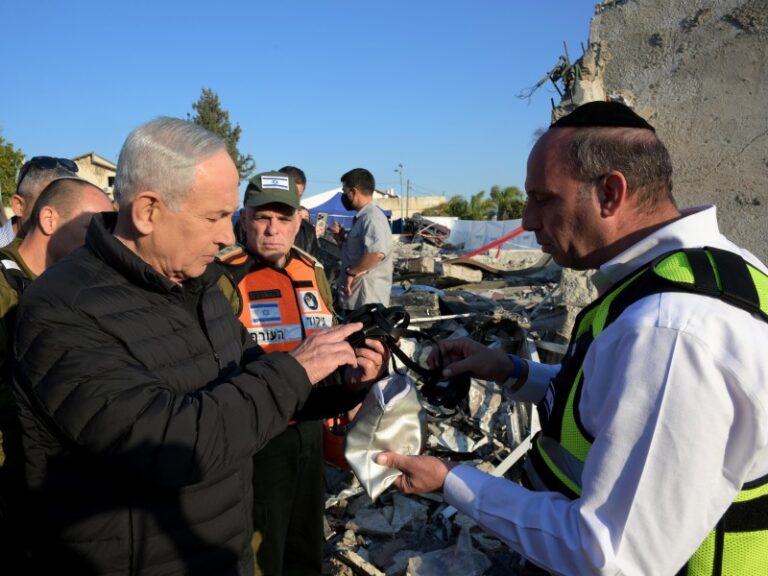
Taiwan's President Tsai Ing-wen meets United States House of Representatives Speaker Kevin McCarthy in California on April 6, 2023. Source: Taiwan President's website
Beijing/Taipei/Los Angeles: China twice intruded into Taiwan’s waters and airspace ever since the meeting between Taiwan’s President Tsai Ing-wen and the United States House of Representatives Speaker Kevin McCarthy, and a bipartisan group of congressional leaders at the Ronald Reagan Presidential Library in Simi Valley, California on April 6, 2023 (Taiwan time).
China’s Taiwan Affairs Office also sanctioned Taipei’s representative to the United States Hsiao Bi-khim, along with the Taiwan-based Prospect Foundation, and the Council of Asian Liberals and Democrats today. Responding to this, the Taiwanese Foreign Ministry stated that China was “overreacting” to the “success” of President Tsai Ing-wen’s recent visit to Guatemala and Belize and transit stops in the United States, and using her visit as a pretext to further suppress Taiwan’s international space and impose so-called sanctions on related individuals and organizations. “Such irrational behaviour not only increases the Taiwanese people’s antipathy to China but also exposes the erratic and absurd nature of the communist regime,” it stated. It made it loud and clear that such moves by China “will only strengthen the Taiwan government’s unwavering faith in freedom and democracy and its commitment to doing its utmost to ensure the international space to which Taiwan is entitled”.
Beijing said today that it will take “resolute measures to safeguard our sovereignty and territorial integrity”. Earlier, it had accused the United States of acting with Taiwan to connive at “Taiwan independence” separatists’ political activities in the United States, conduct official contact with Taiwan and upgrade the substantive relations with Taiwan, and frame Tsai’s visits to the US as a “transit”. “This is a serious violation of the one-China principle and the provisions of the three China-US joint communiqués. It seriously infringes upon China’s sovereignty and territorial integrity and sends an egregiously wrong signal to the “Taiwan independence” separatist forces. China firmly opposes and strongly condemns it,” Beijing stated on April 6, 2023.
Taiwanese Ministry of Defense today reported two Chinese People’s Liberation Army aircraft (PLA) aircraft and 3 People’s Liberation Army Navy (PLAN) vessels around Taiwan by 6 a.m.(UTC+8). It claimed that two of the detected aircraft had entered Taiwan’s southwest air defence identification zone (ADIZ).
On April 6, too, a Chinese People’s Liberation Army aircraft and three People’s Liberation Army Navy (PLAN) vessels were detected around Taiwan. The Ministry claimed that one of the detected aircraft had entered Taiwan’s southwest air defence identification zone(ADIZ). On both occasions, the Taiwanese Armed Forces monitored the situation and tasked combat air patrol aircraft, Navy vessels, and land-based missile systems to respond to these activities.
Earlier, on April 6 (Taiwan time. April 5 in the US), President Tsai raised the ‘democracy in danger’ issue during her meeting with McCarthy. “We once again find ourselves in a world where democracy is under threat, and the urgency of keeping the beacon of freedom shining cannot be understated,” she said. She also expressed her gratefulness to the USA for supporting her in “our efforts to protect our way of life”.
In the discussion with congressional leaders, Tsai reiterated Taiwan’s commitment to defending the peaceful status quo, where the people of Taiwan may continue to thrive in a free and open society.
China today retorted claiming that “the Taiwan question is not about democracy, but about China’s sovereignty and territorial integrity”. The Chinese Foreign Ministery Spokesperson Mao Ning today reporters that “Some countries hype up the false narrative of “democracy versus autocracy”, connive at and support “Taiwan independence” separatist forces in the name of democracy, and use the Taiwan question to contain China. Such moves are highly dangerous and will get nowhere”.
China made it loud and clear that the difference in systems across the Strait is not a barrier to reunification or an excuse for division. “Peaceful Reunification and One Country, Two Systems takes Taiwan’s realities into full account and helps Taiwan achieve longstanding peace and stability after reunification. It is the basic principle for resolving the Taiwan question and the best way to realize national reunification,” Ning said, responding to a prevailing argument in the US in particular that it is not quite right for China to claim sovereignty over the “island democracy” of Taiwan, and that defending Taiwan is defending Taiwan’s democracy.
Ning asserted that “Taiwan is an inalienable part of China’s territory. The sovereignty and territory of China have never been divided and shall never be divided…The future of Taiwan lies in China’s reunification, and the wellbeing of the people in Taiwan hinges on the rejuvenation of the Chinese nation”.
– global bihari bureau





